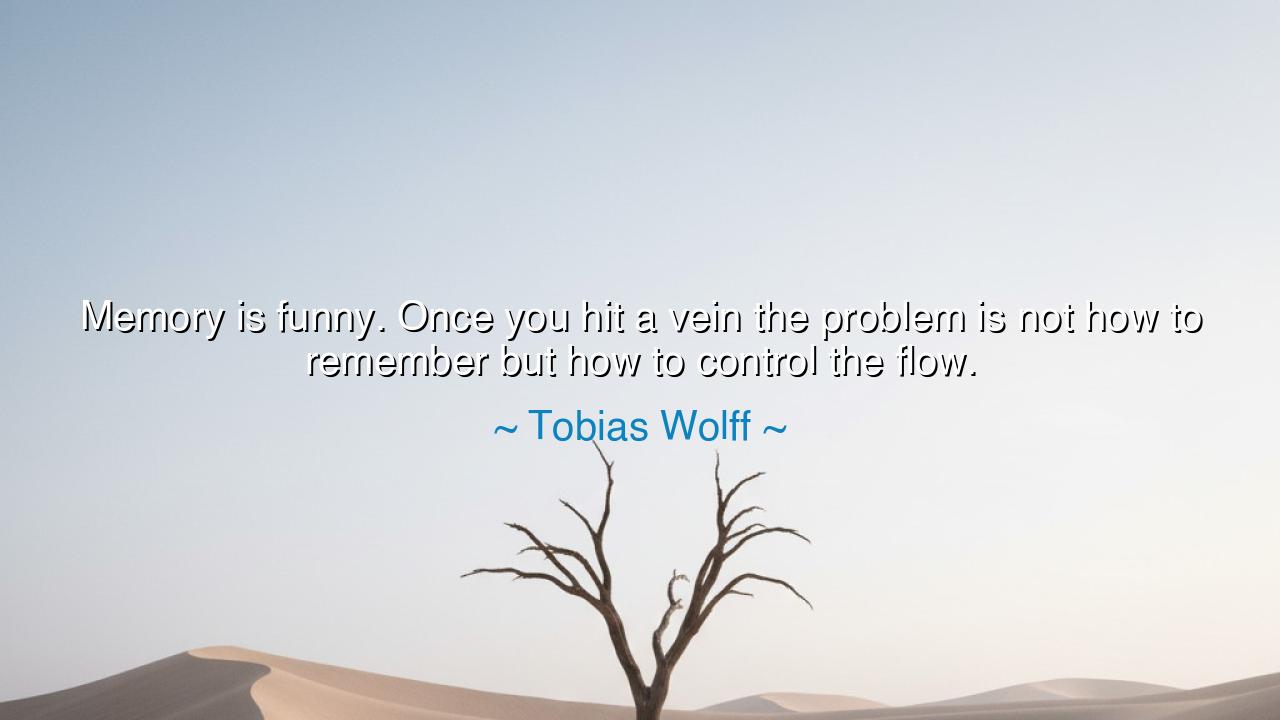
Memory is funny. Once you hit a vein the problem is not how to
Memory is funny. Once you hit a vein the problem is not how to remember but how to control the flow.






“Memory is funny. Once you hit a vein the problem is not how to remember but how to control the flow.” — thus wrote Tobias Wolff, the master storyteller of truth and recollection, whose words cut to the heart of what it means to remember. In this reflection, Wolff does not speak merely of nostalgia or recollection; he speaks of the torrent of memory, of that strange and unpredictable river that runs beneath the surface of every human life. To remember, he tells us, is not always gentle — it is to dig into the earth of the soul, to strike something buried deep, and to find oneself overwhelmed by what rushes forth.
The origin of this wisdom lies in Wolff’s own life, one marked by hardship, reflection, and the relentless search for meaning. A soldier, a writer, a man who has lived in the tension between fact and fiction, he understood that memory is both a gift and a burden. In his memoir This Boy’s Life, he sought to capture the wild and painful truth of his youth — a truth that could not be neatly contained. For when one begins to remember sincerely, one quickly discovers that the past is not still; it moves, it breathes, it overflows. Each memory awakens another, each detail leads to more, until what began as a single spark becomes a flood that threatens to drown the present. Thus, as Wolff writes, the true struggle is not remembering — it is controlling the flow.
To hit a vein — this is the image he gives us, drawn from the language of miners and seekers of treasure. It suggests that memory lies deep within, hidden under layers of time and forgetting, waiting to be struck by accident or longing. And when it is struck, it bursts forth not in gentle streams, but in torrents of emotion — joy, regret, loss, tenderness. Such is the nature of remembrance: once awakened, it does not obey. We may think we command our past, but Wolff reminds us that our past commands us, rising without invitation, unstoppable once it begins.
The ancients, too, knew this truth. The Greek poet Homer spoke of the goddess Mnemosyne, mother of the Muses, from whom all art and song were born. For in memory lies creation, but also danger — for to remember too deeply is to relive pain. The Roman philosopher Seneca warned that memory, left ungoverned, could enslave the mind. Yet even he admitted that forgetting entirely would rob us of our humanity. Thus, Wolff stands in their lineage, offering a modern echo of ancient wisdom: that memory must be tempered — not denied, but held with care, like a wild flame that can either warm or consume.
Consider the story of Marcel Proust, who, tasting a simple madeleine dipped in tea, was suddenly swept into an ocean of recollection. That moment — small, accidental — opened a floodgate of memory so vast it became one of the longest novels in history, In Search of Lost Time. Proust, like Wolff, discovered that memory is not an orderly archive, but a living force — one that surges through the heart without restraint once its gate is opened. What began as a single taste became a symphony of time regained and lost again. To remember is to stand before the sea, powerless against its tides.
And yet, within this overwhelming flood, there is beauty. Wolff does not warn against memory; he honors it. For though it is wild, it is also what keeps us alive to ourselves. To forget entirely is to become a stranger to our own soul. To remember, even painfully, is to know who we are. But we must learn the art of control — not repression, but reverence. Like a writer shaping his story, we must let memory speak without letting it rule. The discipline lies not in silence, but in shaping the noise of recollection into music, meaning, and understanding.
Let this, then, be the lesson: do not fear your memories, but do not surrender to them wholly. When they rise — as they will — stand firm and listen, but hold the reins with gentleness. Reflect, write, speak, create — let the flow find its form. For every life is a mine of memory, and each of us a miner with trembling hands. Strike carefully, for beneath the surface lies gold and fire alike.
Thus spoke Tobias Wolff, and thus we remember: that the heart, once opened to the past, cannot choose what returns. Memory is not a servant, but a force — a river that will carve its own way through time. Our task is not to dam it, but to guide its course — to let it teach us, cleanse us, and, when it must, remind us that we have lived, and that living is the most powerful act of remembrance of all.






AAdministratorAdministrator
Welcome, honored guests. Please leave a comment, we will respond soon